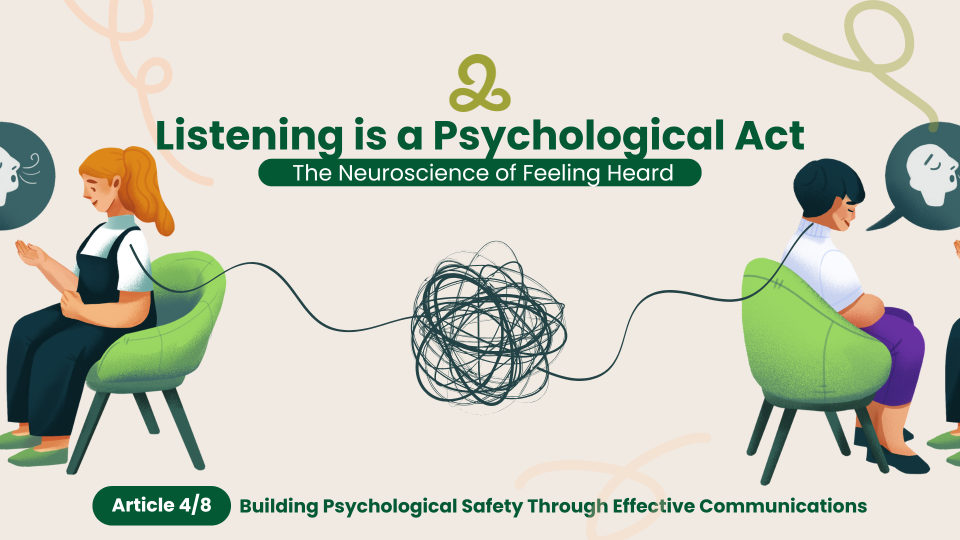There are no items in your cart
Add More
Add More
| Item Details | Price | ||
|---|---|---|---|

Most people think listening is passive. But real listening changes brains—and builds trust faster than words ever could. In our ongoing series on Creating Psychological Safety through Communication, we’ve explored why people often hold back their thoughts, how language reflects the undercurrents of culture and the silent impact of microaggressions. Building on these foundations, we now turn to one of the most undervalued elements of safe communication: Listening. Not just hearing but listening as an emotional and psychological act. One that tells another human being, you matter.
“People unconsciously know when you are not listening to them. Then they say ‘No’ to you.” – James Altucher
The saying “We have two ears and one mouth, so we should listen twice as much as we speak” is a common reminder of the value of listening. Often attributed to the Greek Stoic philosopher Epictetus, versions of this wisdom have echoed across cultures for centuries—because it reflects a timeless truth: listening is foundational to human connection.
Now, imagine, you’re busy wrapping up something important and your child pulls at your arm, asking you to listen. You nod while staying focused on your screen. What happens next? A volcano of tantrums starts to erupt.
That’s co-regulation in action! Or rather, the lack of it.
As adults, we may not throw tantrums, but we still feel the impact of not being truly heard. Over time, we learn to suppress the reaction, disconnect from our emotions, and keep carrying the weight of not feeling acknowledged.
On a lighter note, my 4-year-old has this radar. She knows when I’m really listening versus just nodding along. Most of us do. You’ve probably felt it in the smallest of moments—where the power of true listening left a lasting imprint. Like after a tough client call, when your frustration was at its peak. A teammate didn’t try to jump in with quick fixes or “It happens to everyone” comments. They just sat with you. Let you speak. Nodded when you needed them to. That five-minute moment of just being heard was more healing than any solution.
And they don’t interrupt, no advice, no “I was in the same situation… blah, blah, blah…”. They just listened and said something like: “It sounds like you’ve been trying to hold everything together, but no one has really checked in on how you are doing.”
Reflective listening is often described as emotional containment—holding space for someone’s experience without rushing to fix it.
In the workplace, it’s how trust is built, silence starts to break, and people begin to show up more fully.
It may not solve problems on the spot, but it creates the conditions for clarity, calm, and connection. And that’s the foundation of psychological safety in any team or culture.
In teams, the presence (or absence) of real listening actually shapes everything else: collaboration, innovation and even how conflict is handled. When leaders and peers model reflective listening, something shifts:
But when no one’s really listening, people eventually stop trying. And that kind of silence? It may look calm on the surface, but underneath, it’s where disengagement begins to grow.
So, the next time someone speaks to you, pause for minute. Put the phone down. Close the laptop. Turn towards them, not just with your body, but also with your attention and intention.
You don’t need the perfect words. You just need to stay. To listen without rushing, fixing or turning away.
Because in that steady presence, you’re doing more than just hearing. You are building trust. You are creating psychological safety. You are telling someone: ‘You matter here’.
And in a world full of noise, that kind of listening is leadership.
Did this resonate with you? If yes,
Share a moment when being truly heard made a difference for you.
Tag a colleague who listens, not just during meetings but also in moments that matter.
Stay with us as we continue exploring how communication shapes psychological safety. Up next: The Power of Pause - how making space for silence can speak volumes.
